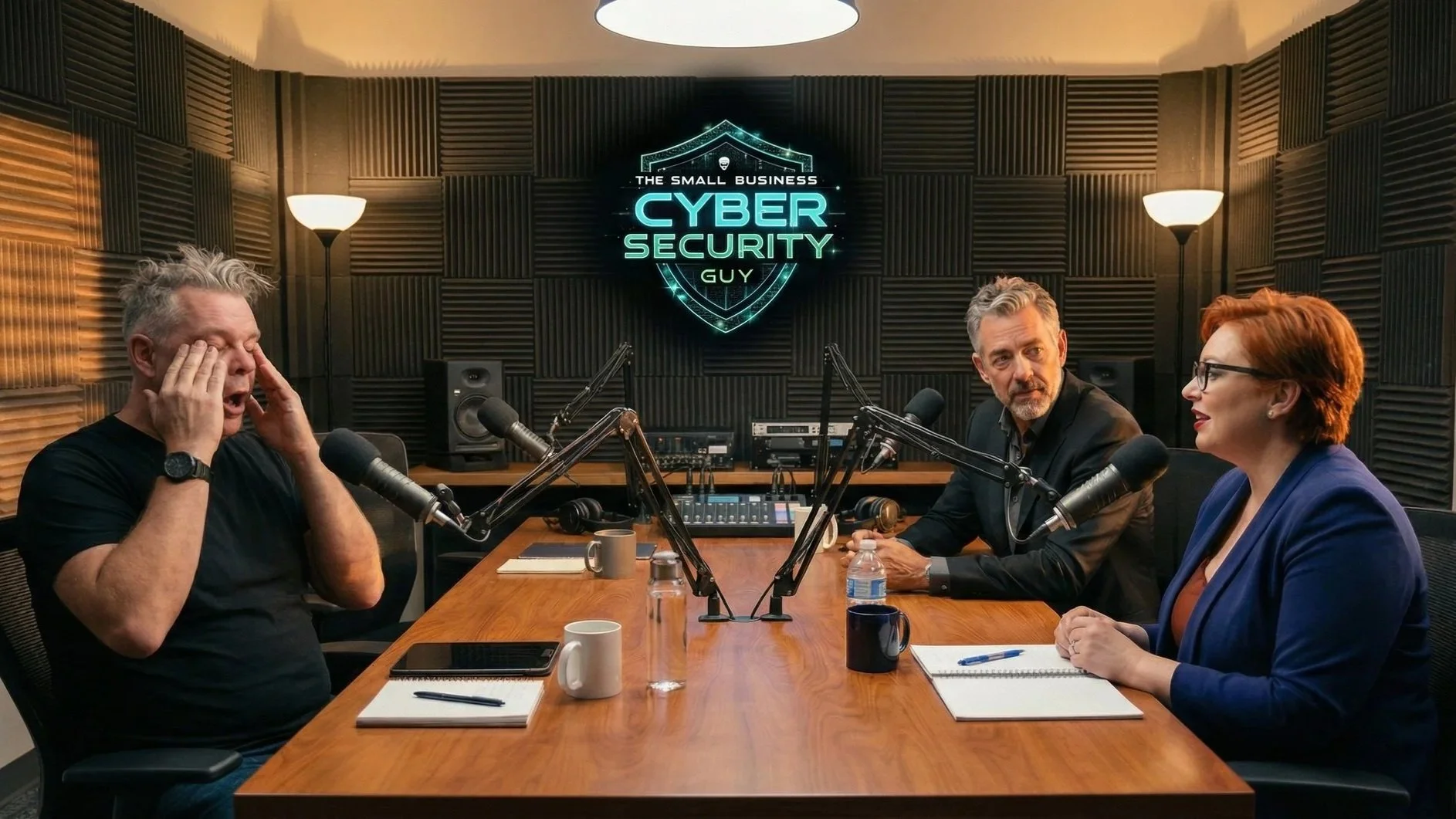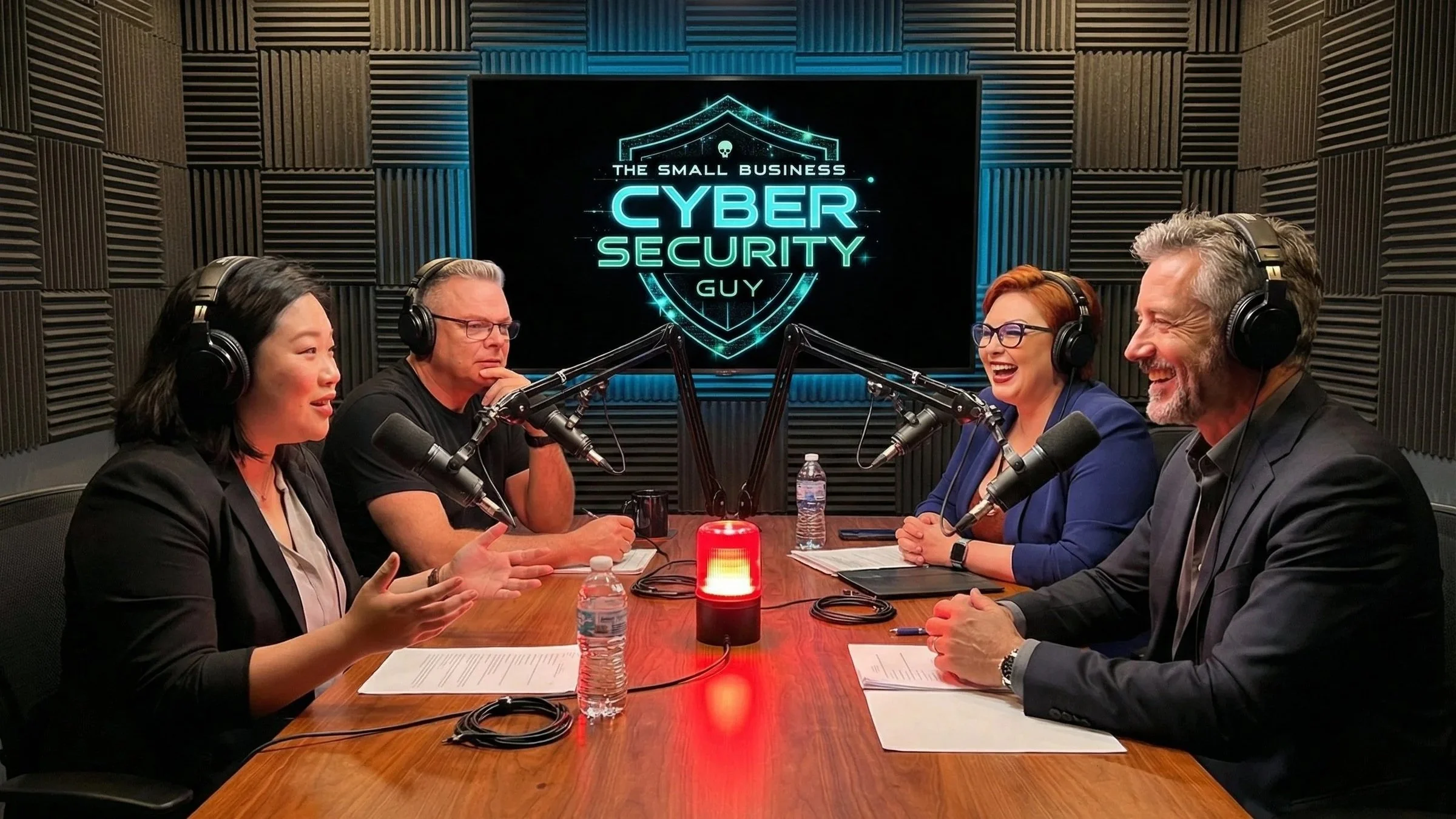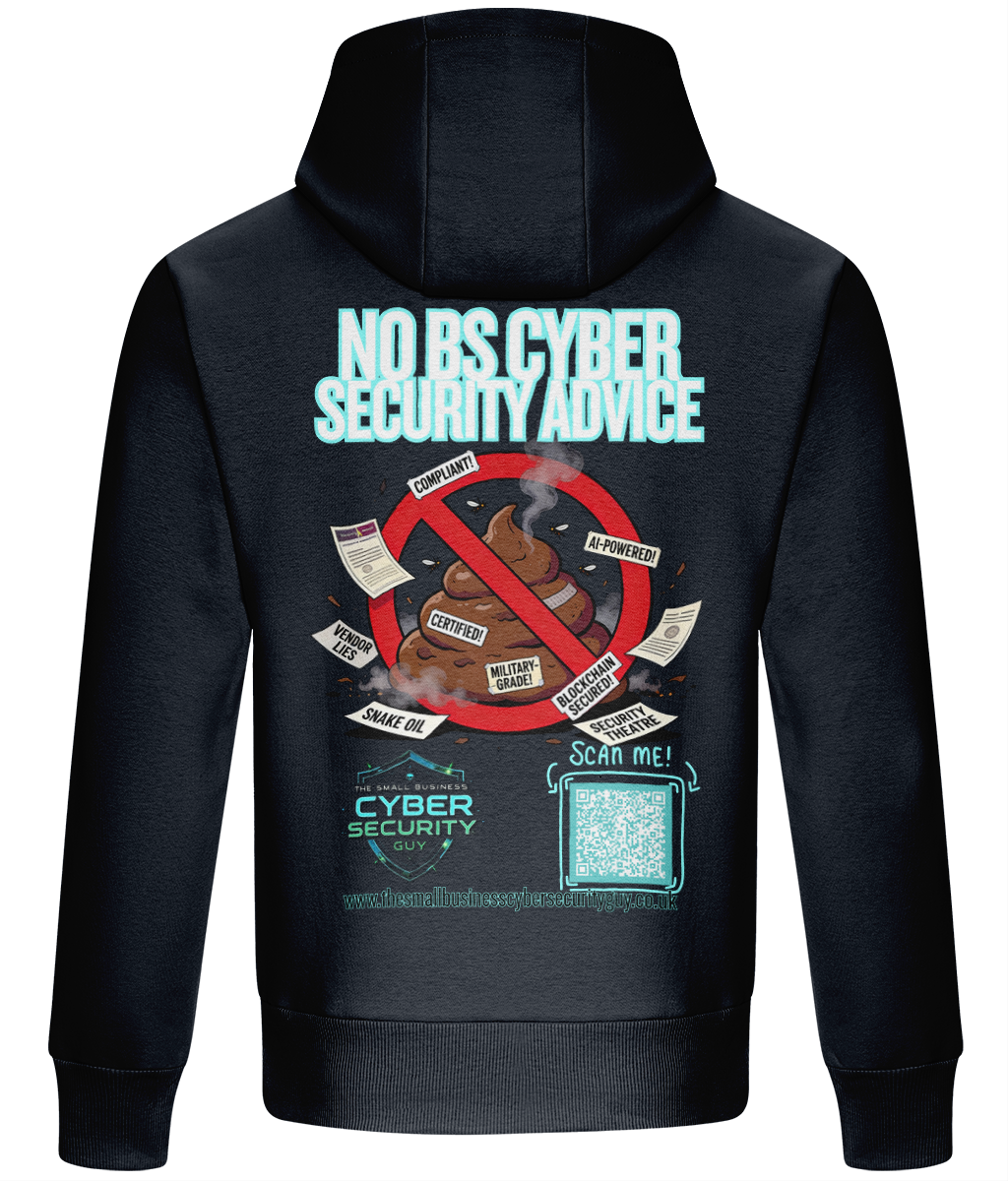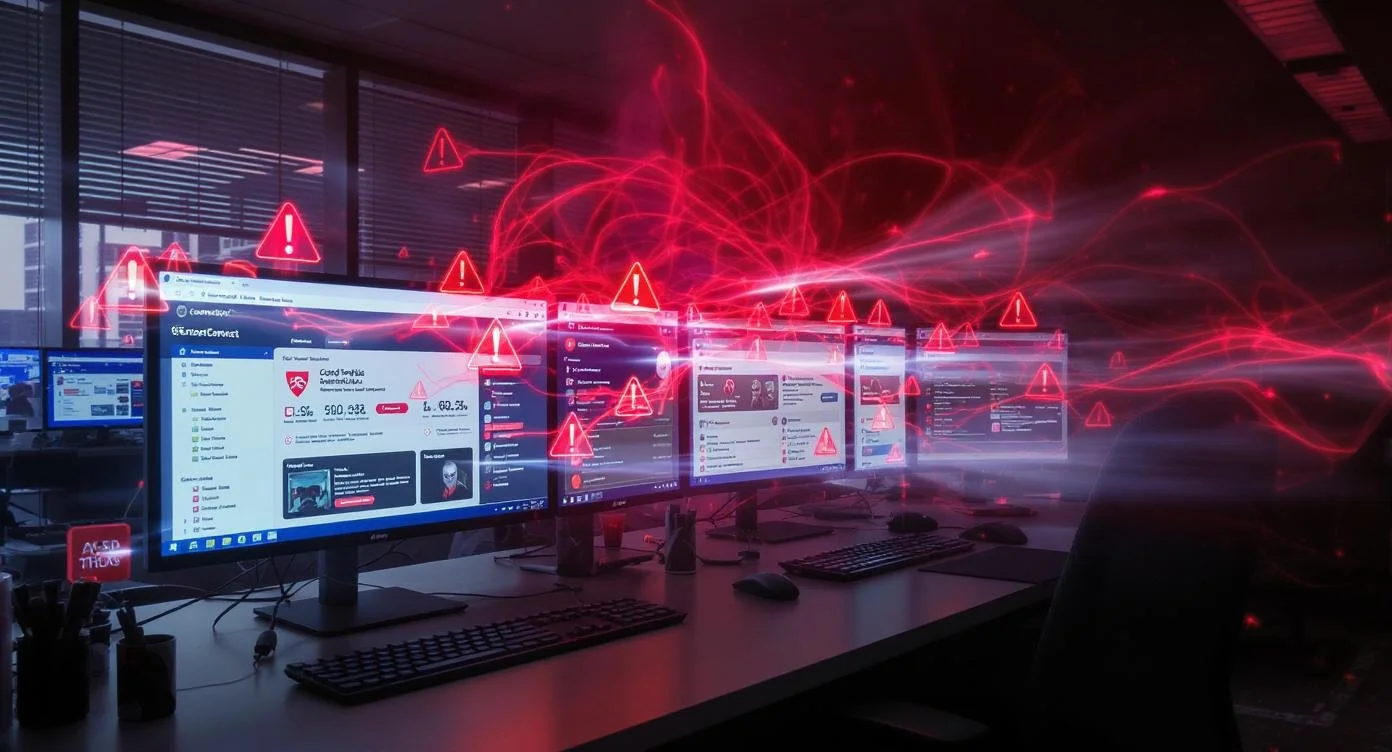⭐100K+ Monthly Downloads
⭐Top 20 Apple Management
⭐100K+ Monthly Downloads ⭐Top 20 Apple Management
The Small
Business
Cyber Security Guy
Welcome to the blog and podcast, where we share brutally honest views, sharp opinions, and lived experience from four decades in the technology trenches. Whether you're here to read or tune in, expect no corporate fluff and no pulled punches.
Everything here is personal. These are my and the team’s thoughts, opinions forged in the heat of battle! And not those of our employers, clients, or any other professional with whom we are associated.
If you’re offended, take it up with us, not them.
What you’ll get here (and on the podcast):
Straight-talking advice for small businesses that want to stay secure
Honest takes on cybersecurity trends, IT malpractice, and vendor nonsense
The occasional rant — and yes, the occasional expletive
War stories from the frontlines (names changed to protect the spectacularly guilty)
I've been doing this for over 40 years. I’ve seen genius, idiocy, and everything in between. Some of it makes headlines, and most of it should.
This blog and the podcast are where we break it all down.
Grab a coffee and pull up a chair, you need to see this!
Stolen Credentials Are the New Normal: Why Your Authentication Is Already Broken (And What This Means for Your Business)
Your passwords are already for sale. The only question is whether you know it yet. Stolen credentials jumped from 10% to 16% of all cyberattacks in just one year, making it the second most common attack vector behind exploits. With 3.9 billion passwords compromised by infostealer malware and 94% of people reusing the same credentials across multiple sites, your business authentication isn't just vulnerable; it's already broken. While you're investing in firewalls and endpoint protection, criminals are buying your employees' passwords for pennies on the dark web. Time to stop pretending multi-factor authentication is optional.
ConnectWise ScreenConnect: The MSP Tool That Keeps Getting Hacked (And Why Your IT Provider Won't Tell You)
Your MSP's favourite remote access tool just got breached. Again. ConnectWise ScreenConnect, the software thousands of managed service providers use to "protect" small businesses, has been hit by yet another cyberattack—this time by suspected state-sponsored hackers. But here's the real scandal: this is the same platform that suffered critical vulnerabilities in 2024, enabling ransomware gangs to turn MSP networks into criminal infrastructure. If your IT provider is still using repeatedly compromised tools while charging you for "enterprise security," you're not getting protection—you're paying for exposure. Time to ask some very uncomfortable questions.
Your Fancy New Printer Just Joined a Botnet: How Procolored Shipped Malware for Six Months
Your £6,000 professional printer just joined a criminal botnet. For six months, Procolored shipped malware-infected drivers that turned customer systems into cryptocurrency theft machines, netting criminals nearly $1 million in stolen Bitcoin. When YouTuber Cameron Coward tried to install the "legitimate" software, his antivirus screamed warnings. Procolored's response? "False positive."
Even after researchers found 39 infected files containing backdoors and Bitcoin stealers, the company kept denying reality until the evidence became undeniable. If you're still trusting hardware vendors without verification, you're not just naive—you're complicit in your own compromise.
US Spy Chief Can't Even Secure a Gmail Account: The Bloody Disgraceful Password Habits That Should Terrify Every Business Owner
The woman who oversees America's spies used the same piss-weak password across multiple accounts for years. If Tulsi Gabbard, the bloody Director of National Intelligence, can't manage basic password security, what hope do the rest of us have? This isn't just government incompetence, it's a wake-up call. When the person responsible for protecting national secrets treats cybersecurity like a Sunday crossword, every business owner needs to ask themselves: are my security practices any better? The answer will probably make you sick to your stomach.
Your Cloud Migration Just Handed Hackers the Keys to Everything You Own
Your board meeting was spectacular. "Cloud transformation complete! 40% cost reduction!" The CEO used "digital excellence" without irony. Three days later, 590 million Ticketmaster records were for sale.
The Snowflake breach wasn't sophisticated hacking—attackers used 2020 passwords from contractor gaming PCs that nobody changed. AT&T lost "nearly all" wireless customer data. Santander: 30 million records including account balances. None had basic multifactor authentication. While executives celebrated digital transformation, cybercriminals exploited the fundamental misunderstanding that cloud security is someone else's problem. The shared responsibility model? Perfect excuse for everyone to assume the other guy handles security.
North Korean IT Workers Are Already Inside Your Company (And HR Just Gave Them Admin Access)
It's 2025. You're reviewing quarterly security metrics, feeling pleased with zero phishing attempts. Meanwhile, the developer who pushed code yesterday is funnelling his salary to Kim Jong Un's nuclear programme.
One facilitator helped infiltrate 300+ US companies, generating $6.8 million for weapons development. Google found them applying to Google. Cybersecurity vendors accidentally hired them.
If the experts are getting played, your HR department doesn't stand a chance. They're not just collecting paycheques—they're systematically funding WMDs while your compliance team ticks boxes about background checks.
Why Iranian Hackers Are Better at Social Engineering Than Your Sales Team
Pull up a chair. We need to talk about something that's going to make your skin crawl.
While your sales team struggles to get prospects to return a bloody phone call, Iranian threat actors are convincing your employees to hand over the keys to your digital kingdom with the kind of charm and persistence that would make a used car salesman weep with envy. These aren't basement dwellers sending "Nigerian prince" emails—they're sophisticated operations turning social engineering into an art form while most organisations treat it like a compliance checkbox.
When fake job offers become delivery mechanisms and your "cybersecurity awareness" training is more obviously fake than actual attacks, you've got a problem that technical controls can't solve.
Lawyers, Judges, and a Bloody SharePoint Backup: When Legal Privilege Meets Cyber Incompetence
In one of 2025’s most disgraceful breaches, Lawcover — the indemnity insurer for thousands of lawyers — exposed the personal and financial data of judges and solicitors through an unencrypted SharePoint backup. It’s not a sophisticated hack; it’s old-school negligence.
Five-year-old legal records, sensitive case data, and passport numbers were all left to rot in the cloud. The incident highlights just how dangerously out of touch the legal sector is when it comes to basic cyber hygiene. In this brutally honest breakdown, we unpack what went wrong, why it matters for the UK, and why your supply chain is now your attack surface.
The RMM Nightmare: How DragonForce Just Showed Us We're All Sitting Ducks
Your IT provider just became your biggest security threat. The DragonForce ransomware gang didn't break down your front door – they got handed the keys by exploiting the very tools meant to protect you. While you've been worrying about suspicious emails, criminals turned SimpleHelp and other RMM software into weapons of mass destruction.
One compromised MSP means hundreds of businesses infected in minutes. The attack already happened. The vulnerabilities were known.
The warnings were ignored. And right now, your business is probably running the same vulnerable tools. The only question is: are you next, or are you prepared?
Why Ransomware Will Keep Winning Until Cybersecurity Becomes a Business Risk – Not a Tech Problem (Part 3/3)
Cybersecurity isn’t IT’s job anymore, it’s yours. Ransomware doesn’t spread because hackers are clever. It spreads because leadership keeps treating security like plumbing: fix it when it breaks.
This final part in our trilogy calls out the boardroom silence, the risk registers no one updates, and the plans that never get tested.
If your business is still relying on hope, luck, or “that one guy in IT,” you’re not secure you’re surviving on borrowed time. This isn’t fear-mongering. It’s your final warning.
Cyber Insurance Claims Are Being Denied – And It's Your Fault
Cyber insurance isn’t a silver bullet and claim denials are rising fast across the UK. Whether it’s poor security hygiene, policy exclusions, or failure to meet basic requirements, many businesses are learning the hard way that they’re not actually covered when disaster strikes.
This guide breaks down why insurers are rejecting claims, what Cyber Essentials (and Plus) have to do with your insurability, and why your MSP might be part of the problem.
If you’re relying on a policy you haven’t read, or assuming “we’re covered” because someone said so once in a meeting, you’re playing a dangerous game.
Cyber insurance only works if you do too and most businesses simply aren’t. Find out how to change that before it’s too late.
You’ve Got a Flood Plan, But No Cyber Plan? Here’s Why That’s a Business Killer
Every UK business has a fire plan. Most have flood plans. Some even worry about theft. But ask what happens when ransomware encrypts every file and locks you out of your own systems? Silence. No plan. I just crossed my fingers and am praying to the cyber gods. While you’ve invested in fire extinguishers and insurance policies, attackers have invested in your network.
Your business isn't ready without a tested, documented, and rehearsed cyber recovery plan. You’re vulnerable. And no, your MSP’s vague promise of "we’ve got it covered" won’t hold up in front of the ICO, insurers, or customers. It’s time to face the truth.
You’ve prepared for everything, except the thing most likely to ruin you.
Still Using RDP Instead of a VPN in 2025? What the F*!k Are You Thinking?
Yes, this is real. Yes, it’s still happening. Businesses in 2025 are still exposing Remote Desktop Protocol (RDP) to the open internet like it’s a perfectly normal thing to do. It’s not. It’s deranged.
It’s like licking a petrol pump and being surprised you got sick. If you’re still running RDP with no VPN, no access controls, no MFA, and no clue , buckle up. This isn’t just a best practice failure.
This is IT malpractice. And if you’re an MSP still recommending it? You should probably stop calling yourself a professional. You’re part of the problem.
Microsoft Teams: Now Available in Phish-Flavoured
Microsoft Teams is the new darling of UK business. It’s chat, calls, meetings, file sharing and productivity all in one app. Unfortunately, it’s also a goldmine for attackers, and they know it.
With the Tycoon 2FA phishing kit now targeting Microsoft 365 users through fake Teams login prompts, criminals are bypassing multifactor authentication in real time. It’s slick. It’s scary.
And worst of all, it works. If your business still believes Teams is “safe because it’s Microsoft,” you’re dangerously behind the curve.
Phishing has moved in. And it brought its own desk chair.
Still Faxing in 2025? The UK Councils Stuck in a Time Warp
It’s 2025, but some UK councils and NHS departments are still sending confidential data via fax machines.
That’s right. No encryption, no audit trail, just a shrieking relic from the 1980s spewing out safeguarding case notes or your latest blood test results from the GUM clinic into a shared office tray.
With the analogue switch-off looming, this isn’t just old-fashioned, or quaint, it’s reckless. Why the hell are printer manufacturers are still enabling this madness - Looking at you HP, Epson, Xerox et al.
If your council or trust or SMB still faxes, they’re not just behind the times. They’re holding the door wide open to the next data breach.
How Crap MSPs, Slack Vendors, and a Culture of Complacency Are Fueling the Ransomware Epidemic
Think the hackers are your biggest threat? Think again. That smiling MSP rep who promised “complete protection” might just be the reason your business is on its knees.
Ransomware rarely walks in the front door it’s invited through by lazy patching, crap backups, and a culture of "just enough" IT.
From misconfigured firewalls to fake dashboards and vendors more interested in sales than security, this is the real story of how ransomware thrives, enabled by the very people paid to stop it.
If you trust your IT supplier blindly, you might already be compromised.
The Meat Rots While the Firewalls Fail: How a Hack Took Out the Backbone of UK Chilled Logistics
A ransomware attack just crippled one of the UK’s key cold chain hauliers, leaving thousands of pounds’ worth of meat to rot before it ever reached supermarket shelves. Peter Green Chilled, who proudly promote their “bespoke IT systems,” couldn’t even keep order processing online. The result?
Spoiled stock, supply chain chaos, and radio silence from a company with £25 million in turnover and not a single cybersecurity certification.
This isn’t just an embarrassing IT failure. It’s a wake-up call. If you're still treating cybersecurity like a nice-to-have instead of a must-do, pull up a chair. Because you're not just vulnerable. You're on the menu.
Root Canal or Rootkit? Why Your Dentist’s PC Might Be More Dangerous Than the Drill
It’s 2025. You’re in a sterile, brightly lit dental surgery — and there it is. A screen glowing with the unmistakable Windows 7 login. The same OS that went end-of-life in 2020. What the actual hell? That PC isn't just a relic — it’s a walking GDPR violation and a ransomware welcome mat.
If your dentist is still running patient records on Windows 7 or even XP, you’re not just risking plaque you’re risking identity theft. Please for the love of all things secure STOP THIS NOW. Before a root canal becomes the least painful part of your visit.
Cyber Essentials 2025: The End of Checkbox Theatre
On 28 April 2025, the UK’s beloved Cyber Essentials scheme quietly lobbed a compliance grenade into your IT department.
The Willow question set has arrived, and with it comes a new standard for audits, especially for Cyber Essentials Plus. The big twist? You no longer get to pick the test machines. That’s right , your favourite “show laptop” patched 20 minutes before the audit isn’t going to save you.
The auditor picks now ,and gives you just three working days' notice. Smoke, meet exit. This article unpacks what’s changed, who it affects, and how to stop your next CE+ audit from turning into a public shaming.
ISO27001 vs Cyber Essentials (Part 3/3): What Needs to Change For Real
Too many UK businesses trust ISO27001 and SOC 2 to keep them safe. They shouldn’t. These frameworks focus on governance, not enforcement. When ransomware hits or supply chains collapse, it’s always the same gaps: patching failures, lack of segmentation, poor endpoint hygiene.
Cyber Essentials, especially CE+, isn’t a tick-box. It’s the defensive baseline that would have saved countless organisations from disaster.
This article lays out the real problem and preaches the blunt truth: no ISO, no SOC 2, no procurement badge means a thing unless Cyber Essentials or equivalent is tested, verified, and enforced.
⚠️ Full Disclaimer
This is my personal blog. The views, opinions, and content shared here are mine and mine alone. They do not reflect or represent the views, beliefs, or policies of:
My employer
Any current or past clients, suppliers, or partners
Any other organisation I’m affiliated with in any capacity
Nothing here should be taken as formal advice — legal, technical, financial, or otherwise. If you’re making decisions for your business, always seek professional advice tailored to your situation.
Where I mention products, services, or companies, that’s based purely on my own experience and opinions — I’m not being paid to promote anything. If that ever changes, I’ll make it clear.
In short: This is my personal space to share my personal views. No one else is responsible for what’s written here — so if you have a problem with something, take it up with me, not my employer.
























